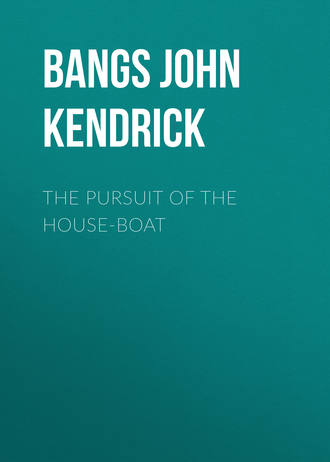 полная версия
полная версияThe Pursuit of the House-Boat
"'You are Mr.—'
"'I am,' I replied. 'Come in. You have come to see me about your stolen watch. It is a gold hunting-case watch with a Swiss movement; loses five minutes a day; stem-winder; and the back cover, which does not bear any inscription, has upon it the indentations made by the molars of your son Willie when that interesting youth was cutting his teeth upon it.'"
"Wonderful!" cried Johnson.
"May I ask how you knew all that?" asked Solomon, deeply impressed.
"Such penetration strikes me as marvellous."
"I didn't know it," replied the stranger, with a smile. "What I said was intended to be jocular, and to put Brokedale at his ease. The Americans present, with their usual astuteness, would term it bluff. It was. I merely rattled on. I simply did not wish to offend the gentleman by letting him know that I had penetrated his disguise. Imagine my surprise, however, when his eye brightened as I spoke, and he entered my room with such alacrity that half the powder which he thought disguised his beard was shaken off on to the floor. Sitting down in the chair I had just vacated, he quietly remarked:
"'You are a wonderful man, sir. How did you know that I had lost my watch?'
"For a moment I was nonplussed; more than that, I was completely staggered. I had expected him to say at once that he had not lost his watch, but had come to see me about the tiara; and to have him take my words seriously was entirely unexpected and overwhelmingly surprising. However, in view of his rank, I deemed it well to fall in with his humour. 'Oh, as for that,' I replied, 'that is a part of my business. It is the detective's place to know everything; and generally, if he reveals the machinery by means of which he reaches his conclusions, he is a fool, since his method is his secret, and his secret his stock-in-trade. I do not mind telling you, however, that I knew your watch was stolen by your anxious glance at my clock, which showed that you wished to know the time. Now most rich Americans have watches for that purpose, and have no hesitation about showing them. If you'd had a watch, you'd have looked at it, not at my clock.'
"My visitor laughed, and repeated what he had said about my being a wonderful man.
"'And the dents which my son made cutting his teeth?' he added.
"'Invariably go with an American's watch. Rubber or ivory rings aren't good enough for American babies to chew on,' said I. 'They must have gold watches or nothing.'
"'And finally, how did you know I was a rich American?' he asked.
"'Because no other can afford to stop at hotels like the Savoy in the height of the season,' I replied, thinking that the jest would end there, and that he would now reveal his identity and speak of the tiara. To my surprise, however, he did nothing of the sort.
"'You have an almost supernatural gift,' he said. 'My name is Bunker. I am stopping at the Savoy. I AM an American. I WAS rich when I arrived here, but I'm not quite so bloated with wealth as I was, now that I have paid my first week's bill. I HAVE lost my watch; such a watch, too, as you describe, even to the dents. Your only mistake was that the dents were made by my son John, and not Willie; but even there I cannot but wonder at you, for John and Willie are twins, and so much alike that it sometimes baffles even their mother to tell them apart. The watch has no very great value intrinsically, but the associations are such that I want it back, and I will pay 200 pounds for its recovery. I have no clew as to who took it. It was numbered—'
"Here a happy thought struck me. In all my description of the watch I had merely described my own, a very cheap affair which I had won at a raffle. My visitor was deceiving me, though for what purpose I did not on the instant divine. No one would like to suspect him of having purloined his wife's tiara. Why should I not deceive him, and at the same time get rid of my poor chronometer for a sum that exceeded its value a hundredfold?"
"Good business!" cried Shylock.
The stranger smiled and bowed.
"Excellent," he said. "I took the words right out of his mouth. 'It was numbered 86507B!' I cried, giving, of course, the number of my own watch.
"He gazed at me narrowly for a moment, and then he smiled. 'You grow more marvellous at every step. That was indeed the number. Are you a demon?'
"'No,' I replied. 'Only something of a mind-reader.'
"Well, to be brief, the bargain was struck. I was to look for a watch that I knew he hadn't lost, and was to receive 200 pounds if I found it. It seemed to him to be a very good bargain, as, indeed, it was, from his point of view, feeling, as he did, that there never having been any such watch, it could not be recovered, and little suspecting that two could play at his little game of deception, and that under any circumstances I could foist a ten-shilling watch upon him for two hundred pounds. This business concluded, he started to go.
"'Won't you have a little Scotch?' I asked, as he started, feeling, with all that prospective profit in view, I could well afford the expense. 'It is a stormy night.'
"'Thanks, I will,' said he, returning and seating himself by my table—still, to my surprise, keeping his hat on.
"'Let me take your hat,' I said, little thinking that my courtesy would reveal the true state of affairs. The mere mention of the word hat brought about a terrible change in my visitor; his knees trembled, his face grew ghastly, and he clutched the brim of his beaver until it cracked. He then nervously removed it, and I noticed a dull red mark running about his forehead, just as there would be on the forehead of a man whose hat fitted too tightly; and that mark, gentlemen, had the undulating outline of nothing more nor less than a tiara, and on the apex of the uttermost extremity was a deep indentation about the size of a shilling, that could have been made only by some adamantine substance! The mystery was solved! The robber of the Duchess of Brokedale stood before me."
A suppressed murmur of excitement went through the assembled spirits, and even Messrs. Hawkshaw and Le Coq were silent in the presence of such genius.
"My plan of action was immediately formulated. The man was completely at my mercy. He had stolen the tiara, and had it concealed in the lining of his hat. I rose and locked the door. My visitor sank with a groan into my chair.
"'Why did you do that?' he stammered, as I turned the key in the lock.
"'To keep my Scotch whiskey from evaporating,' I said, dryly. 'Now, my lord,' I added, 'it will pay your Grace to let me have your hat. I know who you are. You are the Duke of Brokedale. The Duchess of Brokedale has lost a valuable tiara of diamonds, and you have not lost your watch. Somebody has stolen the diamonds, and it may be that somewhere there is a Bunker who has lost such a watch as I have described. The queer part of it all is,' I continued, handing him the decanter, and taking a couple of loaded six-shooters out of my escritoire—'the queer part of it all is that I have the watch and you have the tiara. We'll swap the swag. Hand over the bauble, please.'
"'But—' he began.
"'We won't have any butting, your Grace,' said I. 'I'll give you the watch, and you needn't mind the 200 pounds; and you must give me the tiara, or I'll accompany you forthwith to the police, and have a search made of your hat. It won't pay you to defy me. Give it up.'
"He gave up the hat at once, and, as I suspected, there lay the tiara, snugly stowed away behind the head-band.
"'You are a great fellow,' said I, as I held the tiara up to the light and watched with pleasure the flashing brilliance of its gems.
"'I beg you'll not expose me,' he moaned. 'I was driven to it by necessity.'
"'Not I,' I replied. 'As long as you play fair it will be all right. I'm not going to keep this thing. I'm not married, and so have no use for such a trifle; but what I do intend is simply to wait until your wife retains me to find it, and then I'll find it and get the reward. If you keep perfectly still, I'll have it found in such a fashion that you'll never be suspected. If, on the other hand, you say a word about to-night's events, I'll hand you over to the police.'
"'Humph!' he said. 'You couldn't prove a case against me.'
"'I can prove any case against anybody,' I retorted. 'If you don't believe it, read my book,' I added, and I handed him a copy of my memoirs.
"'I've read it,' he answered, 'and I ought to have known better than to come here. I thought you were only a literary success.' And with a deep-drawn sigh he took the watch and went out. Ten days later I was retained by the Duchess, and after a pretended search of ten days more I found the tiara, restored it to the noble lady, and received the 5000 pounds reward. The Duke kept perfectly quiet about our little encounter, and afterwards we became stanch friends; for he was a good fellow, and was driven to his desperate deed only by the demands of his creditors, and the following Christmas he sent me the watch I had given him, with the best wishes of the season.
"So, you see, gentlemen, in a moment, by quick wit and a mental concentration of no mean order, combined with strict observance of the pettiest details, I ferreted out what bade fair to become a great diamond mystery; and when I say that this cigar end proves certain things to my mind, it does not become you to doubt the value of my conclusions."
"Hear! hear!" cried Raleigh, growing tumultuous with enthusiasm.
"Your name? your name?" came from all parts of the wharf.
The stranger, putting his hand into the folds of his coat, drew forth a bundle of business cards, which he tossed, as the prestidigitator tosses playing-cards, out among the audience, and on each of them was found printed the words:
SHERLOCK HOLMES,
DETECTIVE.
FERRETING DONE HERE.
Plots for Sale.
"I think he made a mistake in not taking the 200 pounds for the watch. Such carelessness destroys my confidence in him," said Shylock, who was the first to recover from the surprise of the revelation.
CHAPTER III: THE SEARCH-PARTY IS ORGANIZED
"Well, Mr. Holmes," said Sir Walter Raleigh, after three rousing cheers, led by Hamlet, had been given with a will by the assembled spirits, "after this demonstration in your honor I think it is hardly necessary for me to assure you of our hearty co-operation in anything you may venture to suggest. There is still manifest, however, some desire on the part of the ever-wise King Solomon and my friend Confucius to know how you deduce that Kidd has sailed for London, from the cigar end which you hold in your hand."
"I can easily satisfy their curiosity," said Sherlock Holmes, genially. "I believe I have already proven that it is the end of Kidd's cigar. The marks of the teeth have shown that. Now observe how closely it is smoked—there is barely enough of it left for one to insert between his teeth. Now Captain Kidd would hardly have risked the edges of his mustache and the comfort of his lips by smoking a cigar down to the very light if he had had another; nor would he under any circumstances have smoked it that far unless he were passionately addicted to this particular brand of the weed. Therefore I say to you, first, this was his cigar; second, it was the last one he had; third, he is a confirmed smoker. The result, he has gone to the one place in the world where these Connecticut hand- rolled Havana cigars—for I recognize this as one of them—have a real popularity, and are therefore more certainly obtainable, and that is at London. You cannot get so vile a cigar as that outside of a London hotel. If I could have seen a quarter-inch more of it, I should have been able definitely to locate the hotel itself. The wrappers unroll to a degree that varies perceptibly as between the different hotels. The Fortuna cigar can be smoked a quarter through before its wrapper gives way; the Felix wrapper goes as soon as you light the cigar; whereas the River, fronting on the Thames, is surrounded by a moister atmosphere than the others, and, as a consequence, the wrapper will hold really until most people are willing to throw the whole thing away."
"It is really a wonderful art!" said Solomon.
"The making of a Connecticut Havana cigar?" laughed Holmes. "Not at all. Give me a head of lettuce and a straw, and I'll make you a box."
"I referred to your art—that of detection," said Solomon. "Your logic is perfect; step by step we have been led to the irresistible conclusion that Kidd has made for London, and can be found at one of these hotels."
"And only until next Tuesday, when he will take a house in the neighborhood of Scotland Yard," put in Holmes, quickly, observing a sneer on Hawkshaw's lips, and hastening to overwhelm him by further evidence of his ingenuity. "When he gets his bill he will open his piratical eyes so wide that he will be seized with jealousy to think of how much more refined his profession has become since he left it, and out of mere pique he will leave the hotel, and, to show himself still cleverer than his modern prototypes, he will leave his account unpaid, with the result that the affair will be put in the hands of the police, under which circumstances a house in the immediate vicinity of the famous police headquarters will be the safest hiding- place he can find, as was instanced by the remarkable case of the famous Penstock bond robbery. A certain churchwarden named Hinkley, having been appointed cashier thereof, robbed the Penstock Imperial Bank of 1,000,000 pounds in bonds, and, fleeing to London, actually joined the detective force at Scotland Yard, and was detailed to find himself, which of course he never did, nor would he ever have been found had he not crossed my path."
Hawkshaw gazed mournfully off into space, and Le Coq muttered profane words under his breath.
"We're not in the same class with this fellow, Hawkshaw," said Le Coq. "You could tap your forehead knowingly eight hours a day through all eternity with a sledge-hammer without loosening an idea like that."
"Nevertheless I'll confound him yet," growled the jealous detective. "I shall myself go to London, and, disguised as Captain Kidd, will lead this visionary on until he comes there to arrest me, and when these club members discover that it is Hawkshaw and not Kidd he has run to earth, we'll have a great laugh on Sherlock Holmes."
"I am anxious to hear how you solved the bond-robbery mystery," said Socrates, wrapping his toga closely about him and settling back against one of the spiles of the wharf.
"So are we all," said Sir Walter. "But meantime the House-boat is getting farther away."
"Not unless she's sailing backwards," sneered Noah, who was still nursing his resentment against Sir Christopher Wren for his reflections upon the speed of the Ark
"What's the hurry?" asked Socrates. "I believe in making haste slowly; and on the admission of our two eminent naval architects, Sir Christopher and Noah, neither of their vessels can travel more than a mile a week, and if we charter the Flying Dutchman to go in pursuit of her we can catch her before she gets out of the Styx into the Atlantic."
"Jonah might lend us his whale, if the beast is in commission," suggested Munchausen, dryly. "I for one would rather take a state- room in Jonah's whale than go aboard the Flying Dutchman again. I made one trip on the Dutchman, and she's worse than a dory for comfort; further—I don't see what good it would do us to charter a boat that can't land oftener than once in seven years, and spends most of her time trying to double the Cape of Good Hope."
"My whale is in commission," said Jonah, with dignity. "But Baron Munchausen need not consider the question of taking a state-room aboard of her. She doesn't carry second-class passengers. And if I took any stock in the idea of a trip on the Flying Dutchman amounting to a seven years' exile, I would cheerfully pay the Baron's expenses for a round trip."
"We are losing time, gentlemen," suggested Sherlock Holmes. "This is a moment, I think, when you should lay aside personal differences and personal preferences for immediate action. I have examined the wake of the House-boat, and I judge from the condition of what, for want of a better term, I may call the suds, when she left us the House- boat was making ten knots a day. Almost any craft we can find suitably manned ought to be able to do better than that; and if you could summon Charon and ascertain what boats he has at hand, it would be for the good of all concerned."
"That's a good plan," said Johnson. "Boswell, see if you can find Charon."
"I am here already, sir," returned the ferryman, rising. "Most of my boats have gone into winter quarters, your Honor. The Mayflower went into dry dock last week to be calked up; the Pinta and the Santa Maria are slow and cranky; the Monitor and the Merrimac I haven't really had time to patch up; and the Valkyrie is two months overdue. I cannot make up my mind whether she is lost or kept back by excursion steamers. Hence I really don't know what I can lend you. Any of these boat I have named you could have had for nothing; but my others are actively employed, and I couldn't let them go without a serious interference with my business."
The old man blinked sorrowfully across the waters at the opposite shore. It was quite evident that he realized what a dreadful expense the club was about to be put to, and while of course there would be profit in it for him, he was sincerely sorry for them.
"I repeat," he added, "those boats you could have had for nothing, but the others I'd have to charge you for, though of course I'll give you a discount."
And he blinked again, as he meditated upon whether that discount should be an eighth or one-quarter of one per cent.
"The Flying Dutchman," he pursued, "ain't no good for your purposes. She's too fast. She's built to fly by, not to stop. You'd catch up with the House-boat in a minute with her, but you'd go right on and disappear like a visionary; and as for the Ark, she'd never do—with all respect to Mr. Noah. She's just about as suitable as any other waterlogged cattle-steamer'd be, and no more—first-rate for elephants and kangaroos, but no good for cruiser-work, and so slow she wouldn't make a ripple high enough to drown a gnat going at the top of her speed. Furthermore, she's got a great big hole in her bottom, where she was stove in by running afoul of—Mount Arrus-root, I believe it was called when Captain Noah went cruising with that menagerie of his."
"That's an unmitigated falsehood!" cried Noah, angrily. "This man talks like a professional amateur yachtsman. He has no regard for facts, but simply goes ahead and makes statements with an utter disregard of the truth. The Ark was not stove in. We beached her very successfully. I say this in defence of my seamanship, which was top-notch for my day."
"Couldn't sail six weeks without fouling a mountain-peak!" sneered Wren, perceiving a chance to get even.
"The hole's there, just the same," said Charon. "Maybe she was a centreboard, sad that's where you kept the board."
"The hole is there because it was worn there by one of the elephants," retorted Noah. "You get a beast like the elephant shuffling one of his fore-feet up and down, up and down, a plank for twenty-four hours a day for forty days in one of your boats, and see where your boat would be."
"Thanks," said Charon, calmly. "But the elephants don't patronize my line. All the elephants I've ever seen in Hades waded over, except Jumbo, and he reached his trunk across, fastened on to a tree limb with it, and swung himself over. However, the Ark isn't at all what you want, unless you are going to man her with a lot of centaurs. If that's your intention, I'd charter her; the accommodations are just the thing for a crew of that kind."
"Well, what do you suggest?" asked Raleigh, somewhat impatiently.
"You've told us what we can't do. Now tell us what we can do."
"I'd stay right here," said Charon, "and let the ladies rescue themselves. That's what I'd do. I've had the honor of bringing 'em over here, and I think I know 'em pretty well. I've watched 'em close, and it's my private opinion that before many days you'll see your club-house sailing back here, with Queen Elizabeth at the hellum, and the other ladies on the for'ard deck knittin' and crochetin', and tearin' each other to pieces in a conversational way, as happy as if there never had been any Captain Kidd and his pirate crew."
"That suggestion is impossible," said Blackstone, rising. "Whether the relief expedition amounts to anything or not, it's good to be set going. The ladies would never forgive us if we sat here inactive, even if they were capable of rescuing themselves. It is an accepted principle of law that this climate hath no fury like a woman left to herself, and we've got enough professional furies hereabouts without our aiding in augmenting the ranks. We must have a boat."
"It'll cost you a thousand dollars a week," said Charon.
"I'll subscribe fifty," cried Hamlet.
"I'll consult my secretary," said Solomon, "and find out how many of my wives have been abducted, and I'll pay ten dollars apiece for their recovery."
"That's liberal," said Hawkshaw. "There are sixty-three of 'em on board, together with eighty of his fiancees. What's the quotation on fiancees, King Solomon?"
"Nothing," said Solomon. "They're not mine yet, and it's their father's business to get 'em back. Not mine."
Other subscriptions came pouring in, and it was not long before everybody save Shylock had put his name down for something. This some one of the more quick-witted of the spirits soon observed, and, with reckless disregard of the feelings of the Merchant of Venice, began to call, "Shylock! Shylock! How much?"
The Merchant tried to leave the pier, but his path was blocked.
"Subscribe, subscribe!" was the cry. "How much?"
"Order, gentlemen, order!" said Sir Walter, rising and holding a bottle aloft. "A black person by the name of Friday, a valet of our friend Mr. Crusoe, has just handed me this bottle, which he picked up ten minutes ago on the bank of the river a few miles distant. It contains a bit of paper, and may perhaps give us a clew based upon something more substantial than even the wonderful theories of our new brother Holmes."
A deathly silence followed the chairman's words, as Sir Walter drew a corkscrew from his pocket and opened the bottle. He extracted the paper, and, as he had surmised, it proved to be a message from the missing vessel. His face brightening with a smile of relief, Sir Walter read, aloud:
"Have just emerged into the Atlantic Club in hands of Kidd and forty ruffians. One hundred and eighty-three ladies on board. Headed for the Azores. Send aid at once. All well except Xanthippe, who is seasick in the billiard-room. (Signed) Portia."
"Aha!" cried Hawkshaw. "That shows how valuable the Holmes theory is."
"Precisely," said Holmes. "No woman knows anything about seafaring, but Portia is right. The ship is headed for the Azores, which is the first tack needed in a windward sail for London under the present conditions."
The reply was greeted with cheers, and when they subsided the cry for Shylock's subscription began again, but he declined.
"I had intended to put up a thousand ducats," he said, defiantly, "but with that woman Portia on board I won't give a red obolus!" and with that he wrapped his cloak about him and stalked off into the gathering shadows of the wood.
And so the funds were raised without the aid of Shylock, and the shapely twin-screw steamer the Gehenna was chartered of Charon, and put under the command of Mr. Sherlock Holmes, who, after he had thanked the company for their confidence, walked abstractedly away, observing in strictest confidence to himself that he had done well to prepare that bottle beforehand and bribe Crusoe's man to find it.
"For now," he said, with a chuckle, "I can get back to earth again free of cost on my own hook, whether my eminent inventor wants me there or not. I never approved of his killing me off as he did at the very height of my popularity."
CHAPTER IV: ON BOARD THE HOUSE-BOAT
Meanwhile the ladies were not having such a bad time, after all. Once having gained possession of the House-boat, they were loath to think of ever having to give it up again, and it is an open question in my mind if they would not have made off with it themselves had Captain Kidd and his men not done it for them.











